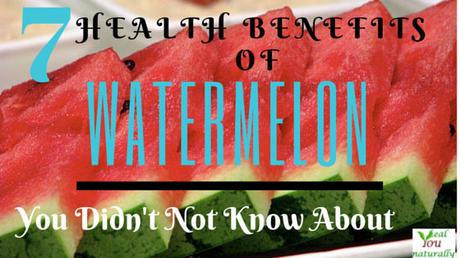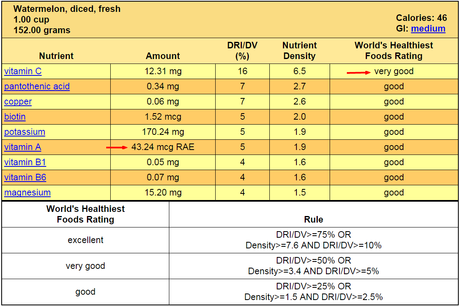
The Benefits of watermelon are many. They range from preventing hypertension, erectile dysfunction to muscle soreness and to speed up wound healing. All of this is due to watermelon being rich in lycopene -a powerful carotenoid antioxidant that neutralizes free radicals. Including it in your diet will also bring other benefits such as helping your body balance the right ratio of cholesterol, while protecting it against some types of cancer like prostate, lung and breast cancer.
A two-cup serving of watermelon contains excellent levels of vitamins A, B6 and C, and also serves as a valuable source of potassium. At 92% water, watermelon delivers needed fluids and nutrients to the body, including lycopene - which has been studied for its potential role in reducing risk of heart disease, various cancers and protection to skin from harmful UV rays - and citrulline - which can help maintain blood flow within the heart and cardiovascular function. [3]
Do you feel tired, weak, limp, or sore after physical exertion? Here is a tip: A nice glass of watermelon juice will definitely help recover. Here is why:
A team of scientists from the School of Agricultural Engineering of Cartagena in Spain, created a watermelon juice that can reduce muscle soreness 24 hours after exercising intensely. The product is a pioneer in Europe where they've found many of its health benefits.
Now let's get to the Top 7 benefits of watermelon:
1. L-Citrulline
One of the more unusual aspects of watermelon is its rich supply of the amino acid, citrulline. Citrulline is an amino acid that is commonly converted by our kidneys and other organ systems (including cells that line our blood vessels) into arginine (another amino acid). The flesh of a watermelon contains about 250 millligrams of citrulline per cup. When our body absorbs citrulline, one of the steps it can take is conversion of citrulline into arginine. [1]
Watermelon contains large amounts of L-Citrulline, a substance produced by the relaxation of the capillaries. In the body, it is metabolized in an amino acid called arginine which has beneficial effects on the heart, the circulatory system which in turn benefits those with hypertension while boosting the immune system.
L-citrulline helps remove ammonia from the liver-an important element in the urea cycle, which occurs in this organ from the combination of ammonia, carbon dioxide and ornithine. Once the process is done, it is expelled from the liver which carries out ammonia.
2. Anti-inflammatory
Cucurbitacin E is another unique anti-inflammatory phytonutrient (called a tripterpenoid) found in watermelon. Like the carotenoid lycopene, this anti-inflammatory nutrient has been shown to block activity of cyclo-oxygenase enzymes and neutralize reactive nitrogen-containing molecules. (Interestingly, cucurbitacin E does not appear to neutralize activity of reactive oxygen species-called ROS-but only activity of reactive nitrogen species, called RNS.) [1]
3. Muscle Fatigue
Watermelon has an important role in muscle fatigue. When we play sports or physical stress is felt in the muscles, lactic acid and ammonia increase. Is then where L-citrulline comes into play by eliminating the factors that cause muscle fatigue- the muscle then prepares for the production of energy. So, drink this juice after intense physical activity for a quick and natural way to combat muscle fatigue.
4. Vasodilation
L-citrulline found in watermelon serves also as a Vasodilator (the widening of blood vessels) which contribute to a healthy sex life, since it promotes and improves blood flow in all parts of the body and relaxes blood vessels. This is a great natural aid for those suffering from erectile dysfunction.
5. Prevents Cancer, Cardiovascular Disease and Blindness
Watermelon contains lycopene a bioactive compound having protective effects against certain types of cancer-specially prostate cancer and cardiovascular disease. According to the National Cancer Institute Lycopene inhibits androgen receptors expression in prostate cancer cells- in vitro and, in conjuction with some of its metabolites {when the body brakes down chemicals, food or drugs metabolites are created}. Metabolites reduce prostate cancer proliferation. There is also evidence that Lycopene prevents macular degeneration syndrome, which is the leading cause of blindness in the elderly.
In cardiovascular disease~ Scientists using a mouse model known to mirror human biochemistry found that consuming a diet including watermelon and watermelon juice provided considerable cardiovascular health benefits as compared to a control group. The team determined that citrulline, a bioactive compound found in watermelon, was responsible for lowering levels of deadly oxidized LDL cholesterol, reducing the volume of arterial plaque and aiding in weight management for the supplemented animals. [6]
6. Anti-aging Effects
Lycopene is responsible for the red color of red-fleshed watermelon. Lycopene can help to eliminate free radicals from the body. Free radicals are thought to exaggerate many of the visible signs of aging such as wrinkles and lines on the skin. Lycopene may also help to guard against conditions such as heart disease, cancer and diabetes.[2]
Vitamin A is stellar for your skin, and just a cup of watermelon contains nearly one-quarter of your daily recommended intake of it. Vitamin A helps keep skin and hair moisturized, and it also encourages healthy growth of new collagen and elastin cells, according to the Cleveland Clinic. Vitamin C is also beneficial in this regard, as it promotes healthy collagen growth. [5]
7. Prevent Cell Damage, Speeds Wound Healing
Watermelon is high in vitamin C. Vitamin C is an excellent source to boost our immune system by maintaining the integrity of our cells and protecting them from reactive oxygen species, that damage our cells and DNA.
In a clinical studies in ncbia, [5] scientist provided evidence that wound healing in subjects judged not deficient in vitamin C can be significantly accelerated with supplements of this nutrient above the recommended daily allowance (RDA).The authors administered daily dosages of 500 to 3,000 mg., which is roughly 8 to 50 times the RDA of 60 mg., to subjects recovering from surgery, other injuries, decubital ulcers, and leg ulcers induced by hemolytic anemia. Genetic impairment of collagen synthesis has also been observed to be responsive to ascorbic acid supplementation in an 8-year-old boy with Type VI Ehlers-Danlos syndrome. Four grams of ascorbic acid daily produced a significant improvement in the quality of newly synthesized collagen but did not alter that formed prior to the supplementation of C. [4]
Finally here is the nutritinal profile of watermelon and a nice chart that showcases some of the top nutrients in it:
Nutritional Profile of Watermelon
Watermelon is an unusual fruit source of the carotenoid lycopene and a rich source of phenolic antioxidants. Watermelon contains cucurbitacin E, a triterpene anti-inflammatory phytonutrient, and unusual amounts of the amino acid citrulline. Watermelon is a very good source of vitamin C. It is also a good source of pantothenic acid, copper, biotin, potassium, vitamin A (in the form of carotenoids), vitamin B1, vitamin B6, and magnesium.
For an in-depth nutritional profile click here: Watermelon. [1]

Tip on preserving watermelons to maximize its benefits by worldhealthiestfoods.com: [1]Uncut watermelons are best stored at temperatures of 50-60°F (10-16°C). In many regions, room temperatures will typically be warmer than 60°F and may be less than ideal for whole watermelon storage due to increased risk of decay. Better storage temperatures will typically be found in cellars or basements that are partly or completely below ground level. While we've seen one study showing increases in lycopene content when whole watermelon was stored at a temperature of 68°F (20°C), we believe that a fully-ripe or close-to-fully-ripe melon will already have outstanding lycopene content and that it would be better for you to err on the safe side in terms of decay risk if you are planning to wait several days before slicing open your watermelon.
Like temperatures above 60°F (16°C), temperatures much below 50°F (10°C) are not recommended for storage of uncut watermelons. This is due to increased risk of chilling-type injury that can decrease shelf life and flavor. (Therefore, the refrigerator would not be a good place for you to store a whole, uncut watermelon for this reason.)
A Word of Caution Regarding Pesticides
During the past decade, non-organic watermelons grown in part of China became the topic of widespread controversy in the popular press following the use of a synthetic growth stimulator called forchlorfenuron in their cultivation.
A combination of heavy rainfall and potential overuse of the growth stimulator actually caused many watermelons on farms in Jiangsu Province to burst open, drawing media attention to this practice. While we are not aware of any data on widespread use of synthetic growth stimulators in the production of non-organic watermelon, we have seen one study predicting residues of forchlorfenuron in the range of 1-5 ppb in watermelons raised with the use of this synthetic growth stimulator. If you are seeking to lower your risk of contamination with all synthetic additives in watermelon and other foods, we recommend that you purchase of certified organic watermelon, since synthetic growth stimulators and other synthetic additives are prohibited in organic food production. [1]
Is there anything would you like to add to this list? Are there other benefits to eating watermelon you can think of? Do share below!
References and other resources
http://www.whfoods.com/genpage.php?tname=foodspice&dbid=31 [1]
http://www.3fatchicks.com/the-anti-aging-benefits-of-watermelon/http://www.watermelon.org/Watermelon-101 [3]
http://www.ncbi.nlm.nih.gov/pubmed/7038579 [4]
http://www.livescience.com/46019-watermelon-nutrition.html [5]
http://www.naturalnews.com/037553_watermelon_heart_disease_weight_management.html http://www.cancer.gov/cancertopics/pdq/cam/prostatesupplements/healthprofessional/page4Comments
comments

